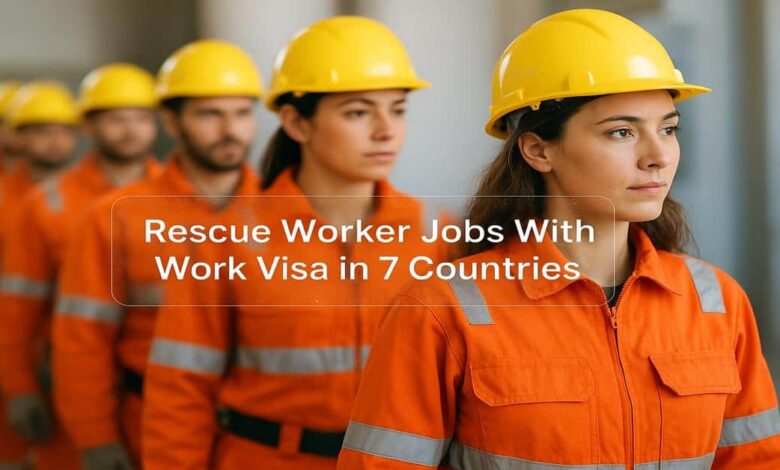Rescue Worker Jobs With Work Visa in 7 Countries 2026

The Rescue Worker Jobs With Work Visa in 7 Countries in 2026 offer a fulfilling path for those ready to use their skills in meaningful ways, with salaries ranging from 28000 to 95000 per year depending on the country and experience level.
These roles are physical rather than remote and welcome candidates with proven emergency response experience, offering stable full-time employment across regions facing rising natural disasters.
Top High Demand Rescue Worker Professions:
The following list includes some of the most sought-after rescue worker roles, the qualifications needed, and the areas where they are in high demand.
| Job Title | Minimum Qualification Requirement | Locations with High Demand |
|---|---|---|
| Paramedic | EMT or Paramedic Certification | Australia, Canada, UK, US |
| Firefighter | Fire Science Degree/Firefighter Certification | Australia, Canada, US, UK |
| Emergency Medical Technician | Basic EMT Certification | US, Canada, Japan, UK |
| Disaster Management Specialist | Degree in Emergency Management or Related Field | US, Japan, Australia |
| Search and Rescue Officer | Military/Police Training or Certification | US, Canada, Japan, Australia |
| Helicopter Rescue Pilot | Commercial Pilot License and SAR Training | US, Japan, Canada |
| Flood Rescue Specialist | Certification in Flood Rescue Techniques | Australia, US, UK |
| Earthquake Rescue Worker | Structural Engineering or Rescue Training | Japan, US, Nepal |
| Volunteer Firefighter | Basic Firefighting Course | Germany, Australia, US |
| Crisis Intervention Specialist | Degree in Social Work or Crisis Management | Canada, UK, Australia |
Where to Find Rescue Worker Jobs With Work Visa:
Countries around the world are actively recruiting skilled rescue workers, often offering attractive visa pathways to make relocation easier. Here’s a closer look at the job opportunities and visa pathways in key countries:
Australia:
- Context: Australia’s vulnerability to extreme weather events, including bushfires, floods, and storms, has led to a critical shortage of emergency services professionals.
- Shortage: Firefighters, paramedics, and disaster response specialists.
- Visa Pathways: Australia’s Temporary Skill Shortage (TSS) Visa allows skilled workers in high-demand occupations to live and work in Australia. Additionally, those with specialized disaster response expertise may be eligible for the Skilled Independent Visa (subclass 189), which offers a pathway to permanent residency.
- Suggested Improvements: Provide salary estimates for different roles and discuss how living costs in major cities (Sydney, Melbourne) compare to salaries.
Canada:
- Context: Canada has been increasingly affected by wildfires, particularly in British Columbia and Alberta. Additionally, rural areas suffer from a shortage of emergency medical services (EMS), highlighting the need for trained professionals.
- Shortage: Firefighters, paramedics, emergency response personnel.
- Visa Pathways: Canada’s Provincial Nominee Program (PNP) and Federal Skilled Worker Program (FSWP) offer immigration options for rescue workers, including those with disaster response qualifications. Additionally, the Express Entry Program allows qualified workers to apply for permanent residency, which includes pathways for those with relevant skills in demand.
- Suggested Improvements: Offer specific examples of job postings available through these visa programs, or provide links to resources for those seeking immigration assistance in Canada.
Check Also: Firefighter Jobs in USA with Visa Sponsorship For Foreigner
United States:
- Context: In the U.S., natural disasters such as hurricanes, wildfires, and floods place immense pressure on local emergency services, especially in rural areas that are difficult to access during crises.
- Shortage: Paramedics, firefighters, rural emergency response teams.
- Visa Pathways: The H-1B Visa Program allows U.S.-based companies to sponsor skilled rescue workers for temporary employment, especially in high-demand states like California and Texas, which frequently experience disasters. Other options, like the O-1 Visa for individuals with extraordinary skills in disaster management, may also be applicable.
- Suggested Improvements: Include data on the most affected states and specific visa categories available for international workers in disaster response roles.
Japan:
- Context: Japan’s geographic location makes it prone to a variety of natural disasters, such as earthquakes, tsunamis, and typhoons. The aging population exacerbates the need for a robust disaster response system.
- Shortage: Disaster response teams, paramedics, search and rescue officers.
- Visa Pathways: Japan offers several visa options for skilled workers, including those in emergency services. The Engineer/Specialist in Humanities/International Services visa can apply to workers in disaster management, while the Specified Skills Visa allows foreign workers to fill jobs in industries facing labor shortages, including emergency services.
- Suggested Improvements: Offer more detailed visa process steps and clarify the distinction between the different types of work visas.
International Organizations Seeking Rescue Workers:
In addition to national governments, many global humanitarian organizations also offer opportunities for rescue workers. These organizations often operate in disaster zones, providing critical services to populations in crisis. Some key organizations include:
- United Nations (UN)
- Save the Children
- International Rescue Committee (IRC)
- Oxfam
- BRAC
- Danish Refugee Council
Many of these organizations are often recruiting for positions in search and rescue, disaster relief, and emergency medical care. These roles can involve traveling to disaster-stricken regions, and some positions may come with hazard pay, travel allowances, and international benefits
Benefits of Rescue Worker Jobs With Work Visa:
Working as a rescue worker in a foreign country provides a range of personal and professional benefits:
- Visa Sponsorship: Many countries offer skilled worker visa programs to attract foreign workers. These visas often come with the benefit of bringing your family with you, allowing for a smoother transition.
- High Demand and Job Security: The increasing frequency of natural disasters and aging populations in many parts of the world means that there is a continual need for rescue workers. This offers long-term job security.
- Competitive Pay and Benefits: In addition to competitive salaries, rescue workers often receive additional benefits such as hazard pay, overtime compensation, and comprehensive health insurance.
- Social Benefits: Many countries offer social security benefits, unemployment insurance, and retirement pensions for skilled workers.
- Training and Career Development: Many countries provide professional development programs to ensure that workers are prepared to handle a variety of rescue situations.
Conclusion:
Rescue worker jobs in 2026 offer meaningful careers with competitive salaries, visa sponsorship, and strong global demand. These roles provide professional growth, stability, and the chance to make a real difference during emergencies. Working abroad as a skilled rescue professional combines purpose, adventure, and long-term opportunities.
Frequently Asked Questions:
What types of rescue worker jobs are in high demand?
Key roles include paramedics, firefighters, emergency medical technicians (EMTs), disaster management specialists, and crisis intervention specialists.
What are the typical qualifications needed for these roles?
Qualifications vary by position but often include certifications like EMT or paramedic licenses, degrees in emergency management, and specialized training in disaster response.




